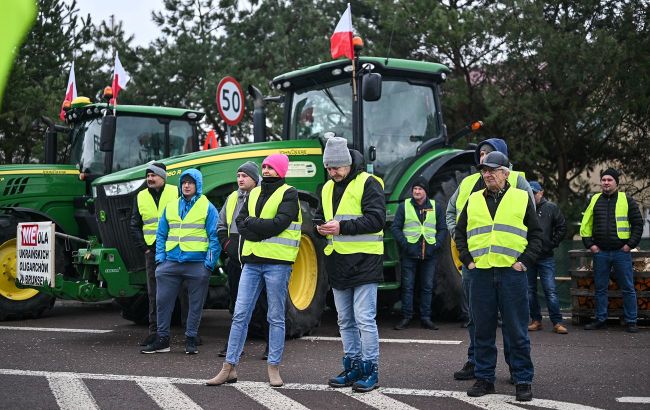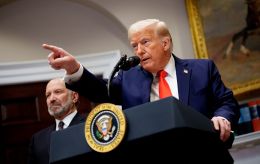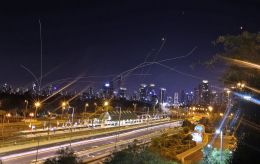Farmers protests and Ukrainian border blockade: Poland's perspective
 Polish protesters on Ukraine border (photo: Getty Images)
Polish protesters on Ukraine border (photo: Getty Images)
Daniel Szeligowski, Coordinator of the Eastern Europe Program at the Polish Institute of International Affairs, provided commentary to RBC-Ukraine on the causes of farmer protests in Poland, which have partially blocked the border with Ukraine, the role of Russia, along with whether the events have reignited discussions about the 1943 Volhynia Massacre and how they have influenced Polish attitudes towards Ukrainians in general.
How is this conflict generally perceived in Poland? Is it solely about grain and economic factors, or is the issue more multifaceted?
It all started around the middle of last year with grain, and it has now escalated into a political crisis. Besides the political dimension, there is an objective problem, there is an objective conflict of economic interests. Poland and Ukraine are competing with each other. This economic problem should have been resolved long ago. Unfortunately, I don't see the political will from the Ukrainian side to reach such a solution.
The approach was to negotiate with Brussels, with the European Commission, and hope that the European Commission would pressure Warsaw, the Polish government, and the Polish government would step back. It worked in the short term, but unfortunately, in the long run, it led us to this crisis, which is now partly political.
Every democratic government has to listen to public opinion. In Poland, it's also impossible to implement a policy that contradicts public opinion, so every Ukrainian statement, like President Zelenskyy's at the UN, all these hints that Poland is collaborating with Russia or that its interests coincide with Russian interests against Ukraine, affect the shift in public opinion in Poland.
And now, because of all this, every pro-Ukrainian decision in Poland is subject to a much higher political cost. So every pro-Ukrainian decision, pro-Ukrainian policy, simply costs much more politically than before. Therefore, all such statements do not help, quite the opposite.
That's why now we see that it's not so easy for the Polish government to solve this problem because 60-70% of people in Poland support the farmers. And they support the government fighting for their interests. Therefore, it's very difficult for the Polish government to go against such public opinion. If citizens support the demands of the farmers, one needs to somehow take those demands into account.
What steps, in general, would Poland like to see Ukraine take?
My personal impression was that everyone in Ukraine thought this matter was related to the Polish elections. Both Ukraine and the Ukrainian government decided it was an electoral issue that would disappear after the elections. So, if it's going to disappear, there's no need to negotiate with the Poles. Just hold out, wait, and after the elections, a new Polish government will come and solve everything.
Why did this happen is a question for the Ukrainian side, Ukrainian experts, and so on. The Ukrainian side created high expectations for the Tusk government, and when they weren't met, disappointment arose.
It wasn't a political problem, and it wasn't an electoral problem. The political component always emerges before elections, of course, but the objective reason is this conflict of interests. How should it be resolved? It seems to me that a three-way compromise is needed: Poland, Ukraine, and the European Commission. Because formally, it was a decision of the European Commission to open the market for Ukrainian goods. So, there are instruments within the European Commission, it's not a problem, in my opinion. A compromise can be found, it requires political will. Whether it exists, I'm unfortunately not sure. My impression is that the Ukrainian side doesn't want to solve these problems now. And it's playing a media show with this delegation at the border.
What is Russia's role in this situation?
Russia didn't invent these problems but is exploiting them. The problem does exist. So it needs to be resolved as quickly as possible before it gets too far because Russia sees that it can use this problem again, and play against Poland, against Ukraine.
If, unfortunately, the Ukrainian side takes the position of waiting, holding out... The media plays against Poland, unfortunately, I can say for sure because Western journalists don't want to delve into the details. If the Ukrainian government thinks that the media will play so much against Poland that Poland will make some crazy concessions and step back – that won't happen. Because there's a broad consensus in Poland that the market has to be protected, and no one will make significant concessions. Moreover, there is public support for such a policy.
How have these events affected Polish society's attitude towards Ukraine and Ukrainians?
Unfortunately, this conflict has negatively influenced how Poles see Ukrainians. And vice versa. All these emotions that build up, this problem that accumulates, it definitely plays against both Poles and Ukrainians. Again, this tells us that it needs to be resolved.
Have problematic issues of Polish-Ukrainian history, such as the events in Volhynia, been brought up amid this conflict?
This issue has not been resolved yet. It's being put aside for now because there are priorities: the war, and helping Ukraine. But this problem will come back.
Not now, I think, because for now, it seems to me, that both sides don't want to talk about it, but it will come back, and it will negatively affect bilateral relations again, and it will also need to be resolved. It's somewhere under the table, but it exists. And my personal opinion is that it will gradually come back, especially if this problem at the border cannot be resolved. They will all accumulate together. The sooner, in my opinion, we manage to settle the situation at the border, plus resolve this issue of economic competition, the better for us. So, this historical issue will come back a little later.
But does it affect the political support of both the Polish government and society for Ukraine in the war?
From the Polish side, assistance to Ukraine on a strategic level, both in terms of the war and integration with the EU, does not contradict Poland's desire and commitment to protect its internal market. I'll say more, the sooner this collision is resolved, the more room for maneuvers the Polish government will have in terms of aiding Ukraine.
And probably, when trust is rebuilt, in this sense, the political cost of supporting Ukraine will be slightly lower.
How much does this story resemble the problems that Poland faced during its European integration? Do you agree with the thesis that during our European integration, there may be even more conflicts with Poland, and with other Eastern European countries?
To some extent, it resembles Poland's problems. Poland was also an economic competitor to the Germans. They also protected their market. The only difference is that Poland's entire process of European integration was stretched over several years, almost 10 years. That is, Western European businesses were given 10 years to prepare for Poland's entry into the EU. Also, a lot of money from the EU budget went to support businesses.
This process hasn't happened here yet. It's a temporary mechanism (lifting tariffs and quotas on Ukrainian exports to the EU - ed). I have the impression that the Ukrainian government wants to legalize it, make it a new status quo. I understand that it's beneficial for the Ukrainian budget, but it's impossible for other players, including Poland, to agree to such decisions.

